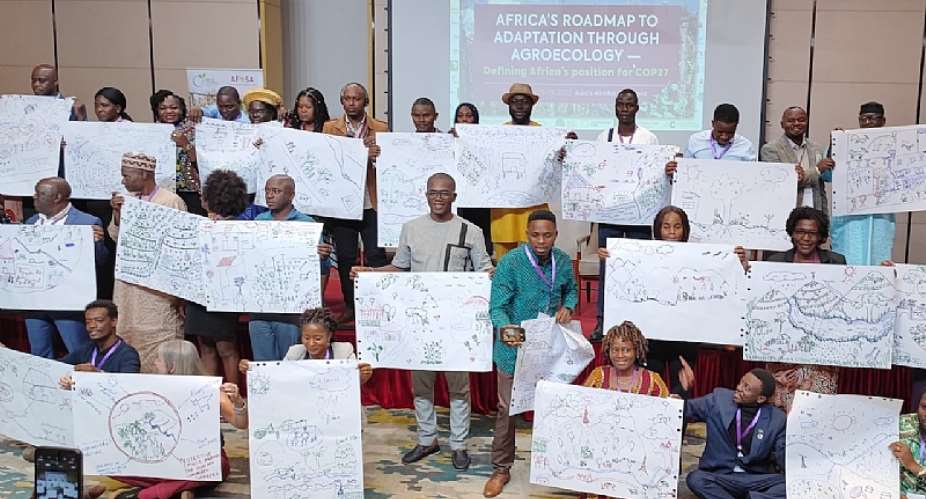Africa’s small-scale farmers risk being disregarded and shut out at international climate negotiations (COP27) in Egypt this November, warns Africa’s largest civil society movement, the Alliance for Food Sovereignty in Africa, today.
AFSA represents over 200 million small-scale farmers, fisherfolk, pastoralists, and indigenous peoples.
The warning comes after the largest civil societies climate change convening in Addis Ababa from 19-21 September 2022 under the theme “AFRICA’S ROADMAP TO ADAPTATION THROUGH AGROECOLOGY: Defining Africa’s Position for COP27.” The convening called on COP27 to put agroecology at the centre of Africa’s climate adaptation, creating resilience for Africa’s small-scale farmers, fisherfolk, pastoralists, indigenous communities and their food systems.
Agroecology – an ecologically, socially and economically sustainable approach to food and farming – is a crucial solution for Africa’s farmers to adapt to climate changes and create resilience. But it is anticipated to be sidelined by governments at COP27 in Egypt this November, and Africa’s small-scale farmers are destined to be deprived of climate funding. The COP27 has been billed by hosts Egypt as ‘Africa’s Adaptation COP, but ignoring small-scale producers’ voices will only further undermine food security at this time of rising hunger.
The IPCC Special Report on Climate Change and Land 2019 recognizes agroecology’s key role: “In summary, increasing the resilience of the food system through agroecology and diversification is an effective way to achieve climate change adaptation (robust evidence, high agreement).”
Dr Million Belay, AFSA General Coordinator and Panel Expert with IPES-Food, said: “Ignoring agroecology is ignoring Africa’s farmers and sidelining the planet’s most vulnerable people who are being hit first and worst by the climate crisis. Africa could feed itself many times over. But agroecology cannot and must not be overlooked by decision-makers as the most effective means to build resilience and enable small-scale farmers, pastoralists and fishers to adapt to climate change.”
Small-scale farmers face impenetrable obstacles to access the negotiations – with restricted conference passes and prohibitive costs for accommodation that only big agro-industry can afford.
Bridget Mugambe, AFSA’s Program Coordinator and focal person for the climate and agroecology working group, said, “Africa is feeling the effects of the climate emergency every day, with rising temperatures, droughts and floods already hitting small-scale farmers and women hard. To sustain our livelihoods and feed communities we are forced to adapt – yet we are receiving negligible funds from the international community. We call on this COP27 to put food systems at the centre of adaptation plans for Africa and direct climate finance to agroecology. Africa can be fed by Africans.”
AFSA is the biggest continental voice for food sovereignty and agroecology in Africa. It is the largest civil society alliance in Africa with 36 member networks with a combined reach of 200 million people in 50 African countries. AFSA’s membership embraces farmers, indigenous communities, pastoralists, hunters and gatherers, fisherfolk, consumer networks, women and youth networks, faith-based organizations and civil society organizations.





 Election 2024: Power outages will affect NPP – Political scientist
Election 2024: Power outages will affect NPP – Political scientist
 NPP is 'a laughing stock' for luring 'poster-stickers', 'noisemaking babies' wit...
NPP is 'a laughing stock' for luring 'poster-stickers', 'noisemaking babies' wit...
 Dumsor: Matthew Opoku Prempeh must be removed over power crisis – IES
Dumsor: Matthew Opoku Prempeh must be removed over power crisis – IES
 PAC orders WA East DCE to process requests from their MP
PAC orders WA East DCE to process requests from their MP
 Defectors who ditched Alan’s Movement to rejoin NPP were financially induced – A...
Defectors who ditched Alan’s Movement to rejoin NPP were financially induced – A...
 Dumsor: Akufo-Addo has taken Ghanaians for granted, let’s organise a vigil – Yvo...
Dumsor: Akufo-Addo has taken Ghanaians for granted, let’s organise a vigil – Yvo...
 April 23: Cedi sells at GHS13.66 to $1, GHS13.07 on BoG interbank
April 23: Cedi sells at GHS13.66 to $1, GHS13.07 on BoG interbank
 GRA clarifies tax status of resident individuals earning income abroad
GRA clarifies tax status of resident individuals earning income abroad
 2024 elections: NDC to officially unveil Jane Opoku-Agyemang as running mate tom...
2024 elections: NDC to officially unveil Jane Opoku-Agyemang as running mate tom...
 Bawumia embarks on working visit to Italy and the Vatican to boost bilateral tie...
Bawumia embarks on working visit to Italy and the Vatican to boost bilateral tie...
